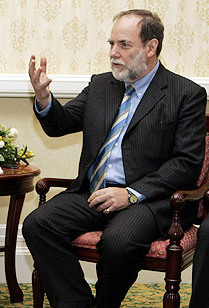Nicky Oppenheimer may have been born into one of South Africa’s most powerful diamond-mining families, but his journey was far from straightforward.
As the second-richest man in the country, with a staggering net worth of $9.5 billion (R171 billion), you might expect him to flaunt his wealth. However, Oppenheimer is known for his modesty and humility, traits not commonly associated with such vast riches.
A Diamond Legacy
Born in 1945 in Johannesburg, Oppenheimer was part of a true diamond dynasty.
His grandfather, Ernest Oppenheimer, was the first in the family to lead De Beers, a diamond company founded in 1888 by Cecil Rhodes.
Ernest, originally the son of a German cigar merchant, was sent to South Africa at 21 to buy diamonds, a trade he quickly mastered. By 30, he had already become the mayor of Kimberley, the heart of South Africa’s diamond industry.
Nicky fondly remembers his grandfather as a quiet yet influential figure, once joking in an interview, “I remember him as the sort of guy that if you bumped into him, you rebounded.”
Learning the Family Business
Oppenheimer’s father, Harry, also left a significant mark on the diamond industry. He led Anglo American for 25 years and De Beers for 27 years.
Although Harry may not have had the same tough demeanor as Ernest, Nicky admired his father’s ability to navigate the complexities of the business world.
“He taught me that business is about risk,” Nicky said. “Being risk-averse gets you nowhere.”
An Education Abroad
Nicky Oppenheimer’s education took him to Britain, where he attended Harrow and later studied at Christ Church College, Oxford, earning a degree in politics, philosophy, and economics.
Looking back, he fondly recalls this time as the “last holiday” of his life, admitting he didn’t work too hard but thoroughly enjoyed the experience.
Despite his third-class degree, Oppenheimer had no regrets, believing it shaped his worldview and approach to life.
Early Career and National Service
After returning to South Africa, Oppenheimer was called for national service.
Despite his Oxford degree, the army struggled to find a suitable role for him. He was eventually assigned to a parking lot, where his job was to inspect vehicles for basic requirements like tires and headlights.
Reflecting on the experience, Nicky humorously said that his main takeaway from the army was how to sign his name quickly.
Joining the Family Business
At just 23, Oppenheimer joined the family empire. By 1974, he was a director at Anglo American and soon climbed the ranks.
In 1998, he took over as chairman of De Beers, guiding the company through significant changes. He played a key role in establishing the Kimberley Process Certification Scheme, aimed at keeping conflict diamonds out of the market.
Oppenheimer also spearheaded the decision to take De Beers private in 2001, though he later stepped down as chairman in 2011.
Navigating Economic Challenges
The global recession of 2008 posed significant challenges for De Beers. New mines had been opened, leading to substantial borrowing, but returns were slow to come in.
Oppenheimer and his family were forced to contribute more money to the company, a risky move at the time. However, this wasn’t the first hardship the business had faced.
Reflecting on his father’s experience during the Great Depression, Nicky acknowledged that tough times were inevitable in such a long-standing industry.
The Difficult Decision to Sell
In 2011, after 85 years of family ownership, the Oppenheimers sold their 40% stake in De Beers for $5.1 billion (R91.7 billion).
Oppenheimer admitted this was a tough decision. While his heart wanted to stay with De Beers, his head told him that selling was the right choice for his family.
The business had become too complex, and eventually, something had to give.
“When Anglo made a reasonable offer, we accepted,” Nicky explained. This marked the end of an era, but also the beginning of new ventures for Oppenheimer.
Life Beyond Diamonds
After leaving De Beers, Oppenheimer shifted his focus to other pursuits.
He co-founded Tana Africa Capital in 2011, a private equity firm, and launched Fireblade Aviation in 2014, offering chartered flights.
He also became passionate about conservation, owning vast tracts of land across South Africa, Botswana, Zimbabwe, and Mozambique.
Though Nicky has passed the business baton to his son, Jonathan, he remains a respected figure in both the business and philanthropic worlds. His legacy extends far beyond diamonds, embodying a life of quiet success and giving back to the world.

Post a Comment